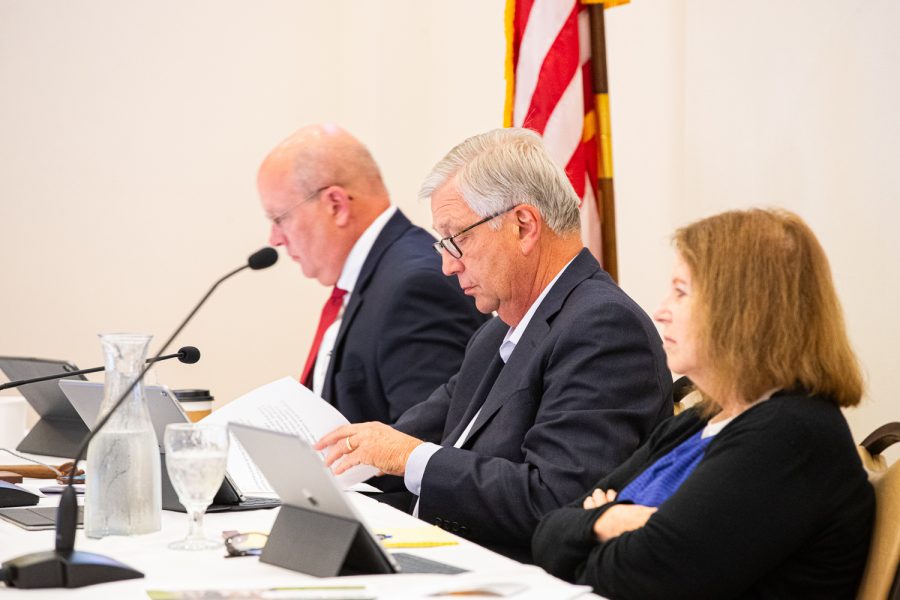Iowa regents approve fiscal 2021 budget with decreased state funding, tuition revenue amid COVID-19 pandemic
The state Board of Regents approved the fiscal 2021 budget in a virtual meeting on Wednesday, where institutional heads shared financial updates from their universities amid reduced state appropriations and COVID-19 economic effects.
Iowa Board of Regents President Michael Richards sits alongside President Pro Tem Patty Cownie during a meeting at the Iowa State Alumni Center in Ames, Iowa, on Thursday, June 6, 2019. The Regents voted in favor of a four percent tuition increase starting in the fall semester of 2019.
July 29, 2020
The state Board of Regents approved its fiscal 2021 budget in a virtual meeting on Wednesday, after the heads of Iowa’s three public universities presented their institutions’ financial plans.
As previously reported by The Daily Iowan, the general university operating budgets for fiscal 2021 are $65.4 million less than in fiscal 2020, based on the Iowa Legislature’s cut of state appropriations by $8 million and the regents’ June decision to freeze tuition rates because of the coronavirus.
The University of Iowa anticipates a total decrease in revenue of $18.1 million, according to regent documents. The UI lost $3.1 million in state funding for fiscal 2021, and saw another approximate $14.8 million decrease in tuition revenue because of fewer enrolled students and frozen tuition rates.
Though the UI has plans in place, if there’s one thing the coronavirus has taught people since March, it’s that they need to expect things to change, UI President Bruce Harreld said.
“Every time we think we understand where this virus is heading, it surprises us,” Harreld said. “We simply don’t know what will happen with the virus. And with our student population declining, and with the state … continuing to de-appropriate, we need to keep our flexibility in all areas.”
The UI evaluated what action it needed to take through three lenses, Harreld told the regents on Wednesday — coronavirus, reduction in state financial support, and changes in student demographics.
While the UI expects the class of 2024 to be a strong one, Harreld said it is unlike the class of 2020 that arrived four years ago. The university’s latest graduating class consisted of more than 5,600 students in their first year, he said.
“And as you know, I purposely reduced our classes, since we’re in a world of declining state support,” Harreld said. “It doesn’t make any sense to overfill our classrooms or to over enroll students so we have to erect more and more residence halls — we just don’t have the resources.”
The UI anticipates 600 fewer students in the incoming freshman class than it has had in the past, Harreld added.
The university’s budget model was created to recognize different economic realities that exist for each of its colleges, Harreld said. Because of the reduction of undergraduate students due to uncertainty surrounding COVID-19, he said four colleges will see decreased budgets — meaning, the remaining eight colleges will see an increased budget in fiscal 2021.
In a press release Wednesday, Iowa Student Action called for the regents to reduce tuition by 50 percent for the duration of the COVID-19 crisis and institute a long-term tuition freeze to mitigate its economic impacts.
Though the regents say COVID-19 caused current financial cutbacks for the UI, Iowa State University, and the University of Northern Iowa, this is actually part of a pattern of decreased appropriations for higher education over the last two decades, the release stated.
“Don’t let the Regents fool you,” said Iowa Student Action’s lead organizer Denise Cheeseman in the press release. “They have the money. They just don’t care about students.”
Schools have shifted the burden of funding to students and families through tuition hikes, the release stated — students hit hardest by tuition hikes and the student-debt crisis, including Black and Brown, undocumented, queer and trans, and poor students.
Cheeseman suggested the regents could make up the loss of state appropriations by defunding campus police departments, cutting the salaries of university administrators, or drawing upon the $999 million endowment the UI recently received from its public/private partnership.
RELATED: Iowa’s public universities’ future funding uncertain as coronavirus strains state economy
“This is, unfortunately, too common of an occurrence in our state and across the nation,” Harreld said of decreased state appropriations in the meeting Wednesday. “And it continues to erode the power and stability of public higher education in our nation. And I believe that is a real problem for democracy going forward.”
In response to a column published in the Iowa Capital Dispatch and elsewhere, that Harreld said reported Iowa’s public universities have administrative “bloat,” Harreld cited numbers from the American Council of Trustees and Alumni.
The UI has less administrative costs per dollar than other tier-one universities, he said, and an average of just over 23 percent more money going to students in its academic mission.
“When you have several decades of declining support from the state, all of us have had to hunker down and have made sure that we become as efficient as possible in our administrative costs to support our academic and research missions,” Harreld said. “So, let’s please calm down. There’s not administrative bloat. There’s actually just the opposite.”
Former Provost Montserrat Fuentes signed a settlement agreement with the UI in mid-July leaving her provost role and taking a position as special assistant to the president, retaining her salary of $439,000 for at least a year. Executive Vice Provost and Senior Associate Provost for Faculty Kevin Kregel has stepped in as interim provost for two years, with the same pay of $439,000.
As previously reported by the DI, Harreld’s base salary will be reduced by 50 percent, effective August 1. Iowa Student Action stated in its press release that this contribution to student emergency funding, and money from the federal CARES Act are a “Band-Aid where reconstructive surgery is needed.”
A one-time allocation of $270,416 from Harreld’s salary will go to the UI’s Student Emergency Fund.
Regent President Mike Richards said he was impressed with institutional heads for agreeing to take pay reductions to mitigate the economic challenges each university is facing.
“One key aspect of leadership is being able to let your organization know that we are all in this together,” Richards said. “Our leaders, both on the academic side as well as the athletic side, are showing the willingness to make significant personal sacrifices for the betterment of our staff and students.”






